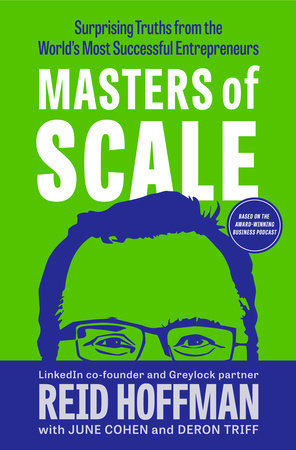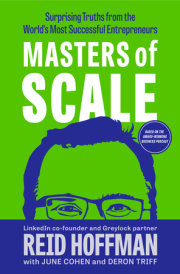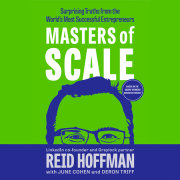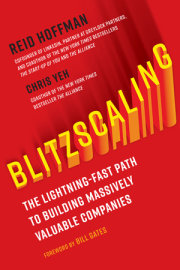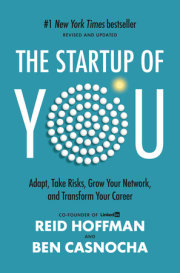1Getting to NoWhen she first pitched her idea for a new kind of career development website to investors, Kathryn Minshew was turned down 148 times . . . not that she was counting.
“There were literally days where I had a ‘No’ over breakfast, a ‘No’ over a 10:30 a.m. coffee, a ‘No’ over lunch,” Kathryn says. And the “Nos” kept coming: “Disinterest at 2 p.m. Someone who left the meeting early at 4. And then I would go to drinks and feel like I was being laughed out of the room.
“And when we finally raised our seed round, I went back and counted. It was both painful and gratifying at the same time—looking at all those names, and thinking, I remember that no. I remember that no. I remember that no. And they sting; every one stings.”
Kathryn is cofounder and CEO of The Muse, and her idea sprang—as so many great entrepreneurial ideas do—from her own experience. Kathryn had spent her youth dreaming of a career in international relations. Secret Agent Minshew! But after a stint with the U.S. embassy in Cyprus she realized her foreign service fantasy didn’t match the reality of the work. So she took a job as a consultant with McKinsey & Company and spent three years in their New York office. When it was time to move on again with her career, she found the experience disappointing—and dehumanizing.
“It wasn’t uncommon to type in a keyword on a job-listing site like Monster.com and get 5,724 results—and they all looked functionally identical to each other. I just felt, for someone starting out in their career, that there has to be a better experience,” Kathryn says.
So she started brainstorming with Alex Cavoulacos, a former colleague from McKinsey—and her future cofounder. They asked themselves: “What if you built a career site that put the individual at the center of that experience? And what if you allowed them to see inside offices before they applied to a company? What if you connected them with experts who could help them understand—How do you negotiate a salary? How do you manage someone for the first time?—all of those career questions that if you’re lucky a mentor or a boss teaches you.”
The more they shared their own experiences and envisioned what they might create, the clearer the opportunity became. “After a couple of long nights at the whiteboard batting this idea around, we became convinced that there was an opportunity to create a trusted, beloved, personalized career destination really focusing on the advice that early-stage professionals need,” Kathryn says.
Kathryn and Alex had a clear vision for the role The Muse could play in users’ lives. But not everyone could see what they were seeing.
“When I started pitching to investors, I ran into a couple of big problems,” Kathryn says. “The first is that most investors don’t match the user archetype that our product was built for. When you think about the classic venture capitalist, they often have been traditionally successful in their career, went to a top school, worked in banking or private equity. They usually get jobs through a very comfortable, well-developed network. And that’s great. But that’s not necessarily the case for everyone. So we were pitching this site and this concept to a demographic that looked at me with confusion.”
The second problem she encountered: complacency with the status quo. “We ran into a lot of people who were unable to see past the current paradigm and the way things had always been done,” Kathryn says. “One venture capitalist—who probably hasn’t looked for a job in twenty years—pulled up Monster.com in the office after I finished my initial pitch. He said, ‘I don’t understand, this looks great to me.’ And I was thinking, ‘You haven’t used that product in two decades. How do you know whether it serves the needs of a thirty-one-year-old woman in the early to mid-stages of her career?’ ”
The “Nos” just kept on coming. Among the ones Kathryn recalls:
“It’s a bit too early for us, but keep in touch.” (“No.”)
“This is a fool’s errand.” (“No.”)
“It’s too expensive.” (“No.”)
“That’s not very tech—it’s not a scalable platform.” (“No.”)
“Aren’t you worried that you’re going to lose all your users once they turn thirty and have babies?” (“No.”)
“I get that women in New York and San Francisco love this product, but I think you’re going to really have a hard time finding women who care about their careers once you go outside of the coasts.” (“No.”)
When you’re still early and unproven in your career—and you’re getting “Nos” from some of the smartest and most successful investors in Silicon Valley and New York City—it can be difficult not to ask yourself, “What if the naysayers are right?” But at the end of the day, you have to listen to your gut instinct. And Kathryn trusted hers. She remembers looking at these guys doling out the “Nos” and thinking, Do you know a lot of women?
Kathryn was right to ask this question. She certainly knew a whole lot more about millennial women than the mostly white, mostly male, mostly middle-aged investors she was talking to. And she also knew more about her business. She held on to what she knew through the arduous pitch process—and it paid off. The reaction to the site when it first launched confirmed all her instincts: “We were getting this incredibly positive feedback from our users, who tended to be twenty-two- to thirty-five-year-old women and men who were saying ‘I love this. This solves my problem, this is exactly what I need.’ ”
As The Muse gained traction among job seekers and employers, Kathryn started getting a lot of calls. “All of a sudden, the same people that had laughed me out of the room two years before were saying ‘Well, of course career-related content can be a great way to engage professionals.’ ”
Today, The Muse serves nearly one hundred million users. Kathryn has raised more than $28 million and has a staff of two hundred. It’s tempting to assume she achieved this despite the “Nos.” But in truth, each of those 148 “Nos” was a clue that ultimately made her business even stronger. Some sharpened her view on who her user was—and who her user wasn’t. Some helped her grasp how her competition might think. And some gave her an early warning about the ways her company might fail. At the end of the fundraising process alone, Kathryn had a roadmap marked with every potential pitfall she’d need to navigate around—and the unexplored territory she could explore ahead of any competitors.
Kathryn’s tale in many ways echoes the origin story of most great startups, and indeed, most great ideas. We’re taught to get to “Yes” as quickly as we can—but there’s so much more to gain by seeking out and celebrating the “Nos.”
This chapter is all about “No”—and why that dreaded word doesn’t always mean what you fear it does.
In fact, the most overlooked opportunity among early-stage entrepreneurs is the information to be gathered from different kinds of “Nos.” A “No” can turn a good idea into a game-changing one. A “No” can clue you in to the size of your idea. A “No” can help you refine your strategy and your goals. In short, the gold is buried in the “Nos.”
Copyright © 2021 by Reid Hoffman. All rights reserved. No part of this excerpt may be reproduced or reprinted without permission in writing from the publisher.

